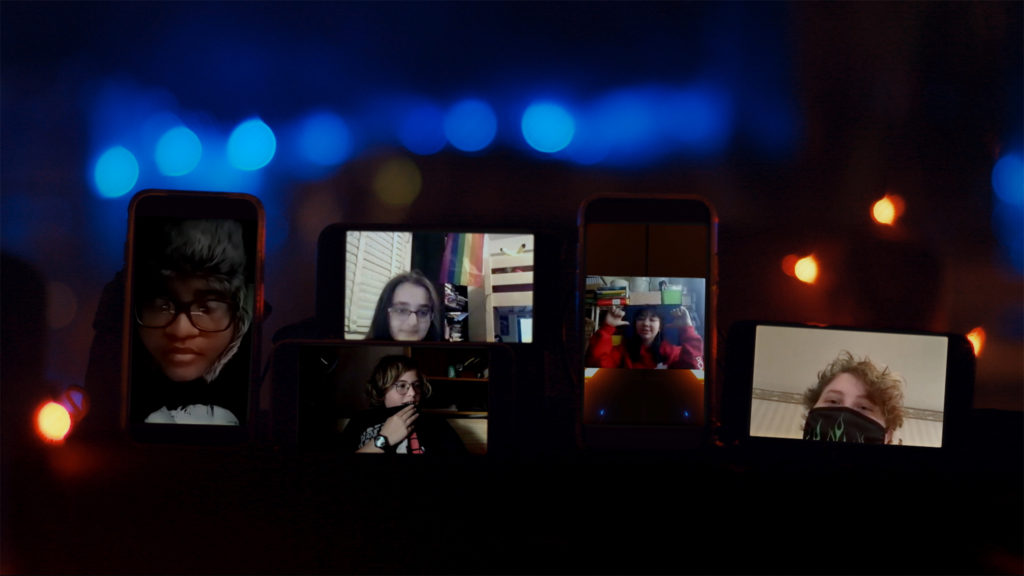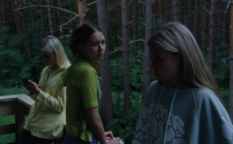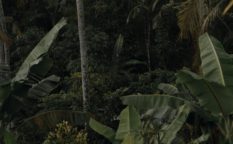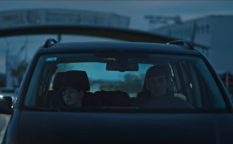IFFR review: Tracing Utopia 1 (2021)
IFFR Ammodo Tiger Short Competition

Finding a safe place is a wish denied to many. Finding a shelter. A place of comfort and acceptance. Being oneself. Living and letting live. It has become even more difficult over the past year. Where do we run to, when we are supposed to stay in? Where would we go when the most doors are closed? No hugs, no body contact. We keep our 2m distance. We are distanced. Confined to four walls, even if physically close to others in a place called home, the safe space might feel very distant.
When they met at Union Docs in New York, Catarina de Sousa & Nick Tyson decided to co-direct a short film with teenagers. Not completely sure which direction to take, they only knew that the narrative would have to deal with the LGTBQ community. During their research, they contacted several youth queer centers, and finally – through a GSA summit, they came across the Generation Q, based in Queens.
The first step was to actively participate in the summit at which de Souza held a workshop on journalist activism, but the true connection was established the moment the two directors stepped into the Generation Q space. Mars, Asher, Jay, Chase, Raphael, Julia and Lindsay became an active part of the project, giving their own suggestions about the shape of the film.
The shooting started in February, and with the situation surrounding the Covid-19 virus, another option presented itself in the realm of Minecraft which the youngsters are actively playing. But here in Tracing Utopia, the game is happening in a digital world that was completely recreated for the purpose of the film. On their dream Island, each of the teenagers has built their own safe space.
Inspired by Chris Marker’s 2084 , Catarina de Sousa & Nick Tyson used the props – the artefacts of the cinematographic history (cameras, projectors, film roles…) to construct their version of a time-capsule in the Union Docs auditorium. Another source of inspiration was the inquiry into the nature and possibility of an ideal community expressed in Maurice Blanchot’s essay ‘The Unavowable Community‘, but also the idea of creating a kind of queer archive was the book ‘Cruising Utopia: The Then and There of Queer Futurity‘ written by José Esteban Muñoz. As the central part of the archive are the video statements of Generation Q members who speak about their feelings, the current situation of the LGTBQ rights and their vision of a better future.
During the shooting, the collective has come up with the idea for their own manifesto, with excerpts from it being projected on the large screen behind the two directors who took up the role of protocolists. The footage filmed on super 8 camera by de Souza during the Queer Liberation March in New York (2020) belnds into the main narrative, serving both as a comment and as one of the topics of conversation between teenagers.
As they browse through their thoughts on human rights, their position in the contemporary society and the utopia, the five are interacting either via video calls or through Minecraft. There is a brief discussion about music when one of the youth says he prefers David Bowie over Queen because he was bisexual, quoting Rebel, Rebel “as the song mentioning something about being gender non-conform” (what was meanthere is probably: “You’ve got your mother in a whirl/ She’s not sure if you’re a boy or a girl”), but the film closes with the collective sing-along of Lemon Demon’s “Touch Tone Telephone” (Neil Cicierega, aka Lemon Demon is quite popular within the LGTBQ community).
Tracing Utopia trailer from Portugal Film can be watched on Vimeo:
Country: Portugal, USA
Language: English
Year: 2021
Runtime: 27′
Produced by: Catarina de Sousa & Nick Tyson
Co-produced by: Ela-Faz Cinema
Directed by: Catarina de Sousa & Nick Tyson
Written by: Catarina de Sousa, Nick Tyson, Asher, Mars, Jay, Chase, Raphael
Cinematography: Catarina de Sousa, Nick Tyson
Camera Assistant: Hobe Ilus
Sound: H. Mur
Sound Mix: Rafael Goncalves Cardoso
Credits and Graphic Design: Catarina Aguiar
Art Assistant: Daniel Monello
Executive Artistic Director: Christopher Allen
Art Direction Advisor: James Barto
Visual Effects: Catarina Aguiar, Nick Tyson
Color Correction: Rita Lamas
Editor: Catarina de Sousa
Research: Nundrisha Wakhloo, Catarina de Sousa, Nick Tyson
Featuring: Mars, Asher, Jay, Chase, Raphael, Julia, Lindsey
Sales: Portugal Film – Portuguese Film Agency
















